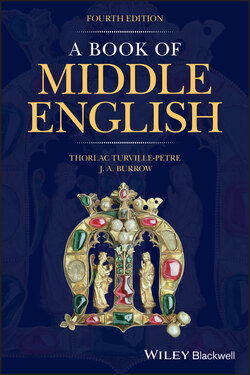Читать книгу A Book of Middle English - J. A. Burrow - Страница 81
5.9 Word‐Order 5.9.1 Inversion
ОглавлениеAs in Old English and in Modern English, the usual word‐order of a statement in Middle English was subject–verb–object. Because Middle English has fewer inflexions to mark the function of words in a sentence, there is less variation of standard patterns than in Old English, though writers of verse had more freedom than prose writers to alter the word‐order for stylistic or metrical effects, provided the relationship between the words was clear from grammatical form or context. Most instances cited here to show standard patterns are therefore taken from the prose texts.
Inversion, where the subject follows the verb, is found particularly in the following circumstances, some of which have been discussed already:
1 In questions (see 5.8).
2 In commands and wishes: construe þou cleerly, 6/126; see who bi grace see may, 6/74. (See 5.6.6.)
3 In conditional or concessive clauses introduced by al, ‘although’, or without a conjunction (see 5.6.6), including hypothetical sentences containing never so: be þeo neode never so gret, ‘however great the need is’, 12/9.
4 Often after an adverb or phrase of place, time, manner etc.: here liþ counforte, ‘here lies comfort’, 6/125–6; for ever schal he do it, and never schal he seese for to do it, 6/73–4; riʒt wel hast þou seide, 6/113; and so þarynne ys noble and gret informacion and lore, 12/27–8; on al þis yvele time heold Martin abbot his abbotrice, 1/56. In a correlative construction, most frequent in Early Middle English, the inverted word‐order is used in the main clause. Common correlatives are þa … þa, ‘when … then’, or so … so: þa þe king Stephne to Englaland com, þa macod he his gadering, ‘when King Stephen came to England, (then) he held his council’, 1/5–6; þa he hafden al his iweden, þa leop he on his steden, ‘when he had all his gear, (then) he leapt on his steed’, 3/25. The inversion in the main clause is a useful indication that þa is an adverb, ‘then’, not a conjunction, ‘when’.
5 After an adverbial phrase that has been fronted for emphasis: by love may he be getyn, ‘he may be reached by love’, 6/222.
6 In negative statements with ne, particularly in early verse: ne kep ich noʒt, ‘I don’t care’, 2/154; ne schaltu nevre, 2/209 (see 5.7).
7 After there, where there is used as a dummy subject: þer ys moche Latyn in þeus bokes, 12/47. Earlier it was used in place of there: it nis no bot, ‘there is no remedy’, 5/552. Sometimes, especially in early texts, there is no dummy subject: wes nævre gæt mare wreccehed on land, ‘there was never before more misery in the land’, 1/43.
